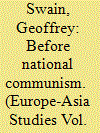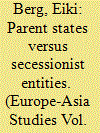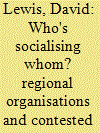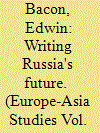| Srl | Item |
| 1 |
ID:
114455


|
|
|
|
|
| Publication |
2012.
|
| Summary/Abstract |
In 1959, Indriks Pinksis, Eduards Berklavs and Vilis Kruminš were among the prominent targets of Moscow's National Communist purge of supposed 'bourgeois nationalists' operating within the leadership of the Latvian Communist Party. A decade earlier all three had been active leaders of the Latvian Komsomol. This article explores the Stalin years of the Latvian Komsomol, and argues that the Komsomol was only able to win an acceptable number of recruits when it abandoned attempts to recruit on the basis of wartime activity or class allegiance and focused on recruiting ethnic Latvians. However, this raised the same issues later faced by the National Communists: as membership was extended to those with a 'doubtful' background, and the press played down 'proletarian internationalism', Moscow took fright. In early 1953 the Latvian Komsomol experienced a purge similar in tone to that which would take place within the Latvian Communist Party more broadly in 1959.
|
|
|
|
|
|
|
|
|
|
|
|
|
|
|
|
| 2 |
ID:
114453


|
|
|
|
|
| Publication |
2012.
|
| Summary/Abstract |
This article explores the issue of post-accession adherence to EU conditions, looking at the case of the Roma. It asks why policies, institutions and programmes put in place by new member states in order to meet EU membership requirements and expectations remain in place after enlargement. It finds that EU conditions have had enduring effects because the key precipitating factors during the accession period almost all remain in some form after accession. These factors include EU attention and expectations, EU funding and capacity building, EU law, NGO advocacy and monitoring, other international programmes and commitments and pressures related to Roma migrants.
|
|
|
|
|
|
|
|
|
|
|
|
|
|
|
|
| 3 |
ID:
114945


|
|
|
| 4 |
ID:
114456


|
|
|
|
|
| Publication |
2012.
|
| Summary/Abstract |
This article questions whether a relatively strong conviction that legitimacy conveys nothing more than acceptance derived from legal recognition. Therefore several indices are constructed which are applicable to comparing and contrasting four major dimensions of political legitimacy both in parent states and in secessionist entities. In measuring political legitimacy in Cyprus, Moldova and Bosnia & Hercegovina in terms of identity and security on the one hand, and democracy and performance on the other, we may be able to observe cases where internal legitimacy has been neglected by the international community. This article concludes that legitimacy is a variable continuously used in the support and rejection of secessionist bids and integrationist endeavours.
|
|
|
|
|
|
|
|
|
|
|
|
|
|
|
|
| 5 |
ID:
114457


|
|
|
|
|
| Publication |
2012.
|
| Summary/Abstract |
This article accounts for the gap between Russia's weak initial implementation of the Kyoto Protocol and its more active engagement in climate policy during the Medvedev presidency. We examine the intersection of climate policy and broader efforts to modernise Russia's economy, drawing attention to synergies between domestic and international politics. We argue that international factors alone do not explain the change in climate policy as they have remained relatively constant. Instead, greater attention toward climate policy results from efforts to introduce new technologies and increase energy efficiency, spurred by the recent financial crisis and a shift in domestic policy priorities associated with the Medvedev presidency.
|
|
|
|
|
|
|
|
|
|
|
|
|
|
|
|
| 6 |
ID:
114454


|
|
|
|
|
| Publication |
2012.
|
| Summary/Abstract |
The Organization for Security and Cooperation in Europe (OSCE) and the Shanghai Cooperation Organisation (SCO) represent competing sets of international norms in Central Asia. The contestation between these sets of norms has not led to a complete polarisation between members of the two organisations, however. Instead, the OSCE has used a range of discursive tactics to reduce political contestation, downplaying some contested issues and seeking shared discourses on security threats. This article explores these tactics and suggests that these discursive shifts may eventually threaten the normative identity of the OSCE and lead to the acceptance of a more hybrid set of security-related norms in the region.
|
|
|
|
|
|
|
|
|
|
|
|
|
|
|
|
| 7 |
ID:
114452


|
|
|
|
|
| Publication |
2012.
|
| Summary/Abstract |
The development of prediction and forecasting in the social sciences over the past century and more is closely linked with developments in Russia. The Soviet collapse undermined confidence in predictive capabilities, and scenario planning emerged as the dominant future-oriented methodology in area studies, including the study of Russia. Scenarists anticipate multiple futures rather than predicting one. The approach is too rarely critiqued. Building on an account of Russia-related forecasting in the twentieth century, analysis of two decades of scenarios reveals uniform accounts which downplay the insights of experts and of social science theory alike.
|
|
|
|
|
|
|
|
|
|
|
|
|
|
|
|